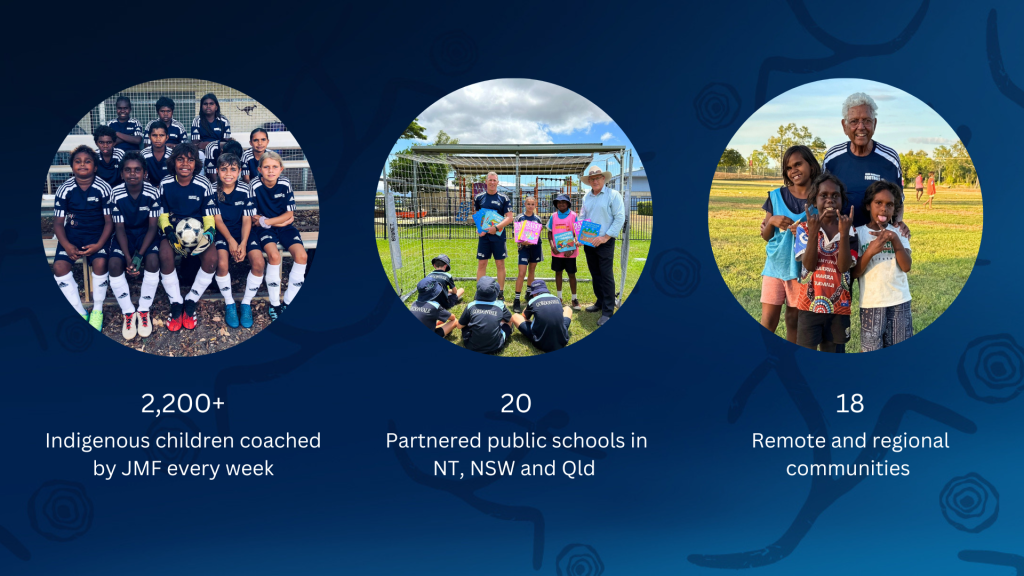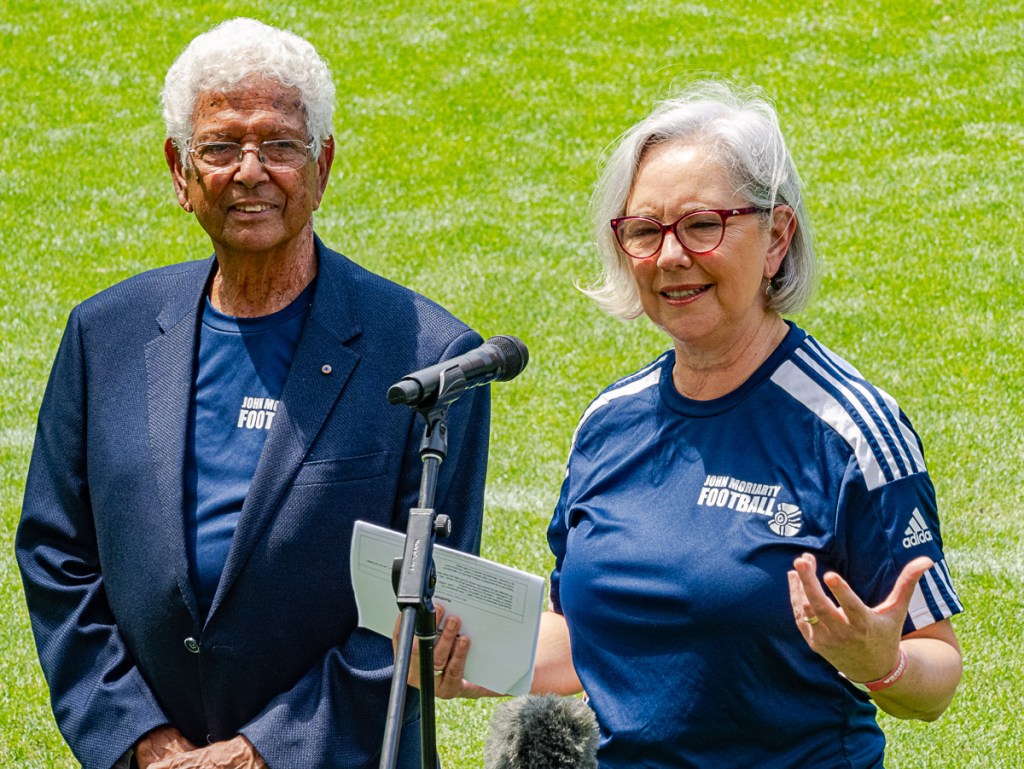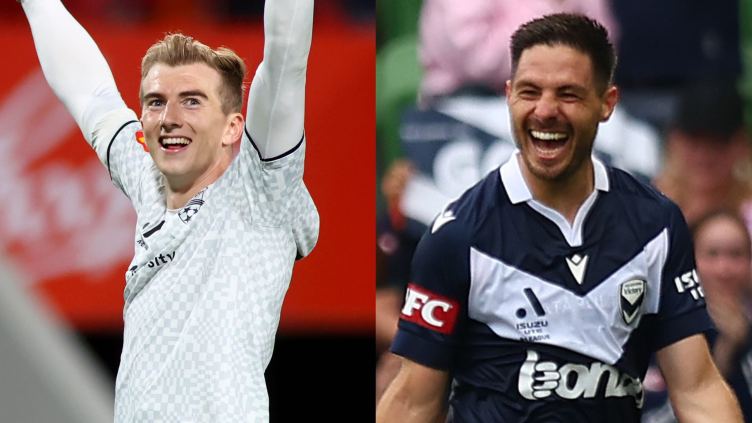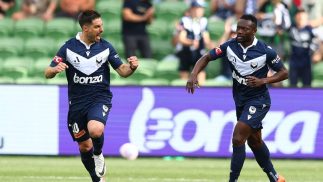Former Socceroo David Williams is ambassador for annual Indigenous Football Week run by John Moriarty Football.
There’s the best part of 100 senior goals on the record of David Williams, but one new goal in particular is taking up much of his focus in the 19th season of that career.
The Indigenous footballer, former Socceroo and current A-League Men striker for Perth Glory has a new role as an ambassador for John Moriarty Football, as JMF hosts Indigenous Football Week (IFW) – its annual celebration of the work it does to use football as a vehicle for social change in remote areas of the country.
The programs that JMF runs, from school-based initiatives to encourage attendance, good behaviour and healthy eating through to the identification of elite talent, are enthusing Williams – and in particular with one aim in mind.
In a game with a shamefully low level of indigenous representation at its elite level, he is one of a handful of such players to reach the top.
“That’s my goal, it’s just to get more kids to play in the A-Leagues,” he says. “If I can do it, why can’t others? That’s how I think.
This week A-Leagues will be celebrating Indigenous Football Week and the incredible work John Moriarty Football does. You can help change the life of Indigenous kids in remote Australia through football by donating to JMF -> www.jmf.org.au
“As an indigenous football player still playing at the highest level over the last 17 years, it’s good to be involved and hopefully have an opinion with what happens with indigenous kids and their pathways to reaching where I have been.”
IFW is one of the biggest opportunities to showcase the work of JMF, a foundation set up more than a decade ago by John Moriarty – the first indigenous player selected for Australia – and his wife Ros. For the second year running the A-Leagues clubs have become partners of IFW, and will use a variety of activities at games this weekend to promote it and invite fans to make donations and support its work.
With no government funding, JMF is entirely reliant on private and corporate donations to run its programs in more than 18 communities in NSW, Queensland and the NT, working with more than 20 schools and providing coaching to thousands of children each week.
At the apex of those programs are a handful of scholarships for children seen as talented enough to have the potential to play professionally – some based in the children’s own communities, and others offering the opportunity to live and study at some of Sydney’s best-known sports high schools.
It is, as Williams acknowledges, a hugely costly exercise and financial constraints are the biggest cap on both the grassroots programs and the identification of the kids with serious talent.
“It’s not about making the next Harry Williams or Adam Sarota, Jade Williams or myself – it’s to give these indigenous kids an opportunity to play A-League football and make a name for themselves, to get themselves out of remote community areas and support themselves and their families.”
His own path was, as Williams admits, rather easier having grown up in Brisbane and having his talent seen by the more conventional scouting networks. Eventually he played in Europe, for the Socceroos and at 35 is still going strong for Perth Glory.
“I definitely had more opportunity in the sense that in that sort of urban environment, if it doesn’t work out with one team, you can just move to the next team or the next coach,” he says.
“The opportunity out in the country and in these remote areas is definitely harder to come by, but that’s where JMF comes into play to actually go out and find the kids, to work with them and then, when the talent is identified, bringing them to the metro area. But that takes time and resources.”

Eventually, once the all-consuming schedule of being a professional footballer is given up, Williams would like nothing more than to be out in the field looking for young footballing talent.
“I wouldn’t say I have a passion for coaching (professionally) because being a professional footballer for so long it would be even less time to see my family and I don’t know if I have that commitment in me.
“But to work with an organization like JMF would probably for me be even better because then it’s giving back to the indigenous community, trying to find talented boys and girls who want to have a passion for something. Maybe they don’t have a passion for football but if we can show them that they’re good enough that can always change.
“At the moment there’s a lot of kids out there who just want to play AFL or rugby league (partly because) there’s a lot of well-known indigenous athletes who aren’t football players.
“So it’s all about changing their mindset and proving to themselves that they actually could be good at football with their agility and their technique and fitness.”
READ: John Moriarty’s incredible life story in his own words
Most of all, Williams wants to see the broadest possible perspective applied, so that natural athletes from remote communities get the biggest possible chance of succeeding in elite sport, of one variety or another, and create a virtuous circle of role models.
“I would love to think that football clubs and football departments could work with the NRL and AFL clubs because they might have kids there in their programs or trials who they can see aren’t going to make the cut, but they’re still very skillful.
“Maybe they can’t catch a ball but they can dribble the ball. Imagine having relationships with the AFL on that and having a contact saying, ‘Hey ,we’ve got this kid here, he’s not going to quite make the AFL team, but he’s so good, he’s agile with a round ball at his feet.’
Donate HERE to John Moriarty Football
“A conversation like that could then be life changing to an indigenous kid. That way these organisations aren’t just looking to boost themselves, they’re boosting the lives of individual Aboriginal kids and potentially giving them a better life.”
For now, the priority is building awareness of JMF’s work, and trying to put the broadest possible spotlight on what can be achieved.
“We want to put resources in but at the end of the day that comes down to funding from governments and sponsors,” he says. “So that’s, I guess, what everyone’s working towards.
“What John and Ros have done in creating this and with the contacts they’ve made, to keep pushing and surviving and still being successful, it’s amazing.

“But the numbers could be higher if there was more funding, if they were able to house more kids or to spend more time looking or training more coaches.
“With limited help I think JMF have done such a great job. As a current player I want to use my ability to promote that while I’m still playing, while I’m still relevant.”





